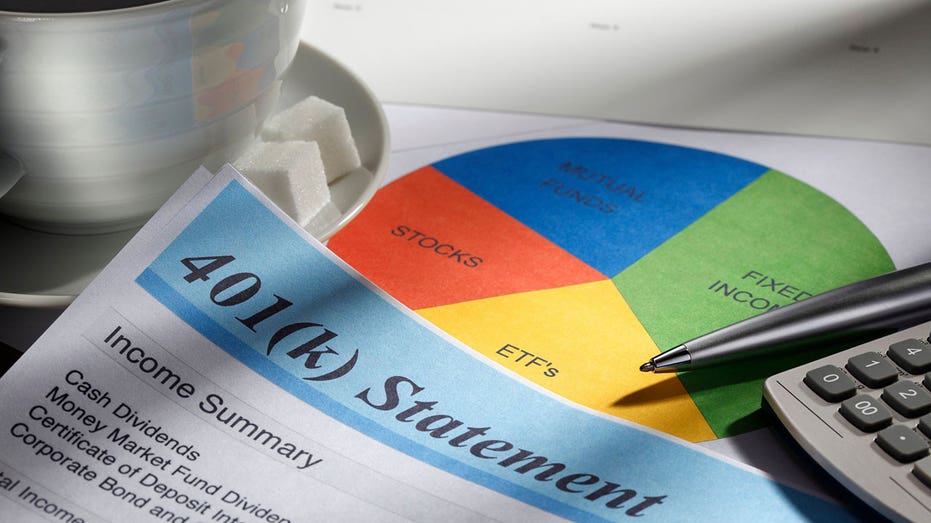Is this the No. 1 401(k) move for 2025?
It’s easy to get spooked when the market drops, but the best financial moves are often made amid uncertainty
Stock market will force Trump to pivot on tariffs: Jason Katz
UBS managing director and senior portfolio manager Jason Katz discusses whether President Donald Trump's tariffs will jeopardize the passing of his tax cuts on 'Varney & Co.'
If you're watching the markets in 2025 and feeling uneasy, you're not alone. Recent tariffs announced between the U.S. and China – along with retaliatory measures – have rattled investor confidence and pushed major indexes into correction territory with the S&P having the worst quarter since 2022.
The headlines scream uncertainty, portfolios are flashing red, and it’s natural to wonder if now is the time to retreat or lean in and make a bold move.
But, what if this dip presents a golden opportunity? Specifically, could frontloading your 401(k) right now be one of the smartest financial moves you make this year?

Frontloading means contributing a significant portion – or even all – of your annual 401(k) limit early in the year, rather than spreading it out evenly over each paycheck. (Getty Images / Getty Images)
What Does It Mean to Frontload Your 401(k)?
Frontloading means contributing a significant portion – or even the entirety – of your annual 401(k) limit early in the year, rather than spreading it out evenly over each paycheck. For 2025, the IRS allows up to $23,000 in contributions (or $30,500 if you’re 50 or older).
HERE'S WHAT TRUMP IS REALLY UP TO WITH HIGH-STAKES TARIFF GAMBIT
Instead of monthly contributions, you might hit the cap by spring – locking in more shares while the market is still down. If you have money in the bank to pay your bills, there could be a brilliant time to rob Peter to pay Paul and put more in your 401(k) while prices are cheaper.
Why Frontloading Could Make Sense Right Now
1. You’re Buying While It’s On Sale
With markets down thanks to tariff-fueled volatility, prices on stocks and index funds are lower than they’ve been in months. Especially in technology. Frontloading lets you scoop up more shares for the same dollar, positioning you to benefit when the market eventually rebounds.
Trump economic advisor reacts to Bill Ackman's tariff warning: 'Ease off the rhetoric'
National Economic Council Director Kevin Hassett joins 'Fox & Friends' to discuss President Donald Trump's tariff push despite a call from hedge fund billionaire Bill Ackman to pause tariffs in order to resolve 'unfair asymmetric' deals.
2. Time in the Market Beats Timing the Market
By getting your money in earlier, you give those dollars more time to grow. Compounding works best with time on your side, and historically, markets bounce back – often when investors least expect it. This is what helps the "snowball" effect.
3. It Takes the Emotion Out
It’s hard not to let emotions cloud your decisions during turbulent times. Frontloading is a way to make a strategic move and then let the market do its thing, without constantly second-guessing yourself throughout the year.
GET FOX BUSINESS ON THE GO BY CLICKING HERE
Are There Any Pitfalls?
1. You Could Miss the Employer Match
Some companies only match contributions per pay period. If you max out early, you might leave employer dollars on the table for the rest of the year. It’s important to read the company Summary Plan Description (SPD) to see how your plan handles matches before frontloading.
2. You Might Not Be Catching the Bottom
Markets can always fall further. Frontloading doesn’t guarantee you’re buying at the lowest point, and there’s a chance your investments dip more before they rise. If the tariff war continues, this could send markets further down this year before they rebound.
Trump's 'max tariffs' will slow economy, could trigger recession, expert says
Payne Capital Management President Ryan Payne discusses the threat of a recession as President Donald Trump sticks to his tariff plan on 'Varney & Co.'
3. Cash Flow Can Get Tight
Frontloading requires having the flexibility to take a hit to your take-home pay early in the year. If that’s going to put stress on your budget or force you to dip into savings, it might not be worth it.
CLICK HERE TO READ MORE ON FOX BUSINESS
Consider a Hybrid Strategy
If going all-in feels too aggressive, consider a partial frontload. Increase your contributions for the next few months while prices are still down, then return to your regular pace. This gives you some upside potential while keeping cash flow manageable.
Ted’s Final Thought
It’s easy to get spooked when the market drops. But often, the best financial moves are made when things feel uncertain. If your budget allows and your plan supports it, frontloading your 401(k) in a down market – especially one driven by temporary shocks like tariffs – might just be the best financial move you make in 2025.






















